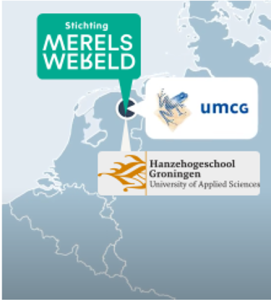Press Release
Dutch foundation initiates European patient driven research in lung cancer
Stichting Merels Wereld, in cooperation with the University Medical Hospital Groningen (UMCG) and the University of Applied Science (HG), starts a European scientific research in the ROS1+ lung cancer, a rare oncogene driven cancer. Since the ROS1+ lung cancer is rare, it is important to join forces to gain more knowledge on this type of lung cancer.
This initiative is special because it is patient driven: the patient is the initiator as well as the goal of the research. Patient empowerment and initiating research have a positive impact on the survivability.
Stichting Merels Wereld is founded by Merel Hennink, who has the rare ROS1+ lung cancer. Through the network of the foundation with the HG and UMCG a substantial research program is established. This unique collaboration between the Groningen-based universities and a private organisation completes the circle. Through research on diverse levels, more knowledge of this disease will be gained to improve the treatment options. Besides initiating the research program, Stichting Merels Wereld funds it partially. Read more: Research program international
Research
At the Hanzehogeschool, researchers and students are working in cell model systems, to study the resistance mechanisms of the ROS1+ lung cancer. At the UMCG, tumor biopsies of people with the ROS1 fusion are being studied and the effects of different medicines are being tested. Results are shared en used to generate new insights. This research is unique because Europeans with the ROS1 fusion who must have a biopsy, can actively participate. Stichting Merels Wereld bears the costs of the logistics in this process
Stichting Merels Wereld
Stichting Merels Wereld is founded by Merel Hennink. In November 2014 (at age 46 with 2 small children) she got the diagnosis lung cancer, stage four, not curable. People with this rare oncogene driven cancer (ROS1 fusion) call themselves ROS-1ders and are globally organized. Merel, as a ROS1der herself, is mostly active on a national and European scale. With different activities she raises awareness of ROS1 and wants to actively contribute to survival and a manageable quality of life for people with this type of lung cancer.
ROS1ders
ROS1 patients have organized themselves on a global level, the ROS1ders. Besides support, education and empowerment, the ROS1ders started their own research into the ROS1 fusion called: The Global ROS1 initiative. This European initiative is part of this Global Initiative,
Read more: ROS1-ders
More about the ROS1+ lung cancer
The ROS1+ lung cancer is a type of cancer, which is caused by an error in the human DNA. The ROS1 fusion genes in lung cancer is first described in 2012. In the Netherlands, approximately 40 persons are diagnosed with the ROS1+ lung cancer annually. They are relatively young (50 years) and have mostly a non-smoking history.

